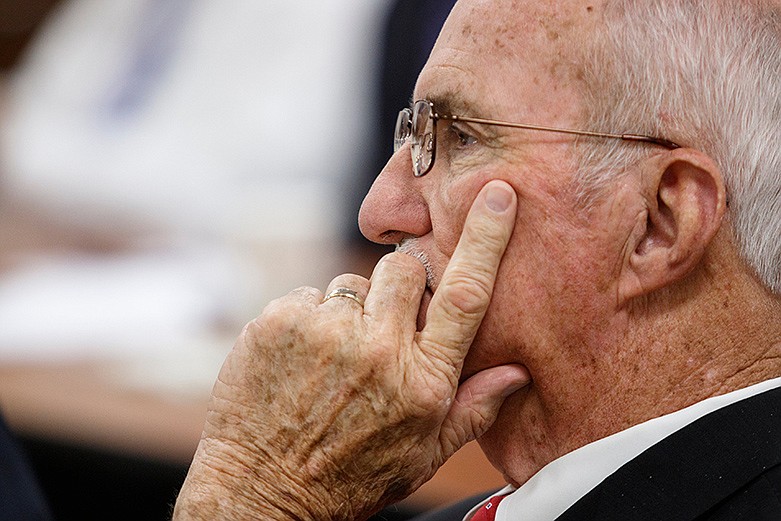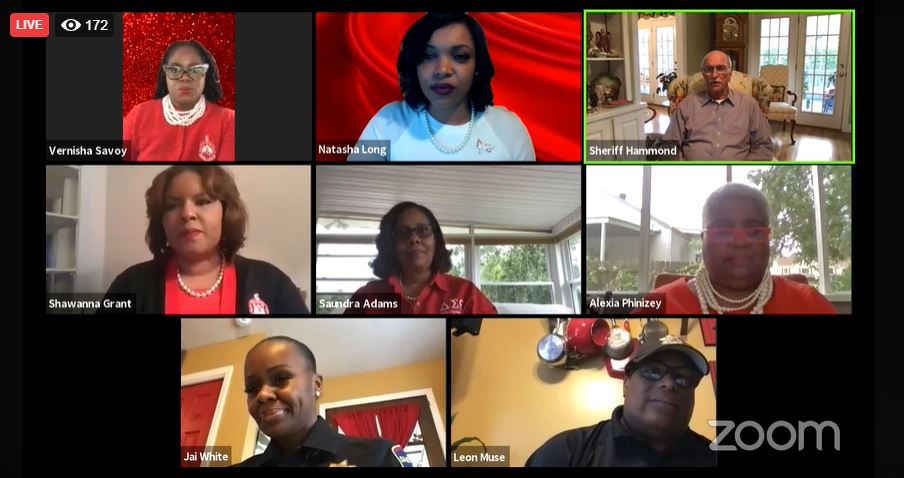Since protests against police brutality began in the area following the death of George Floyd, Hamilton County Sheriff Jim Hammond has publicly denounced the actions of the Minneapolis police officer who pinned Floyd under his knee for nearly nine minutes until he was dead, while defending his department's policies during an online panel Wednesday.
Hammond and other members of the Hamilton County Sheriff's Office repeatedly emphasized the role they believe the community should play in holding law enforcement accountable during the panel hosted by the Chattanooga Alumnae Chapter of Delta Sigma Theta Sorority.
"I 100% agree with [Chattanooga Police Department] Chief [David] Roddy," Hammond said when asked what his thoughts were on Floyd's death. "There is no amount of justification for choking out someone in that manner with a knee on the neck. That is not taught in any academy I ever attended there's no excuse for it."
Three weeks ago in a now-viral tweet, Roddy expressed his opinion that officers who failed to see what was wrong with Floyd's arrest should turn in their badges.
As the Wednesday panel continued, members of the chapter posed multiple pre-submitted questions about the sheriff's office's policing and relationship with the local black community to Hammond and to Capt. Van Hinton and Deputy Jessica White.
When asked more than once if any changes, like those requested by protesters, would be made in light of Floyd's death and recently publicized acts of police brutality against citizens nationwide, Hammond suggested that the sheriff's office already had similar policies in place and if there is a problem, it is not with the policy but with implementation.
"I do believe that there's already processes that clearly indicate that we follow every one of the things that people say they want to see," he said. "So, there is nothing to change. Now if we can better do one of those policies that's what mentorship is about, that's what a [field training officer] is about."
But, if need be, Hammond said he is not afraid to fire an employee after giving them due process, citing a few deputies he let go in the last year.
One solution suggested by the sheriff's office for improving the relationship between officers and the public called for a more diverse pool of eligible applicants.
Hammond said that recently, out of 15 applicants, only one stayed through the required polygraph testing and was eligible.
To him, many people in the community don't want to apply for the job, partially because of the pay, but he believes there are ways to possibly increase that pay in the future.
"Ultimately, you're not going to [see] major change unless you get young men and women who are interested in making a difference, not by protesting, although that has its place, and saying 'I want to become a police officer,'" he said. "And when you begin to bounce those numbers, you're gonna see more diversity and more interaction between the races, so that you can get a better balance and perhaps understand each other more."
White expressed similar sentiments.
"If you want to see change, apply with us and be the change that you want to see," White said. "Apply with us; we are looking for good men and women."
Hinton said that a more diverse force can do a better job of holding other officers accountable and can help build the community.
"What's important for the African American community is for us to see people that look like us in patrol cars, you know, and that's the way we build our community," he said. "That's the way we give back to our community. We police our police in a way that we know each other that makes it personal in authentically connecting with the community."
In addition to more diverse citizens joining their ranks, Hinton suggested that parents also have a role to play.
In his closing statement directed at the black community, Hinton asked that people educate their children on how to interact with law enforcement. He said they should work to survive the encounter.
"Don't run," he said. "We saw what happened in Atlanta. We're [the black community] supposed to survive the encounter. That's the bottom line. You live, live, live."
Hinton said that growing up in the late 1960s his parents told him how to address an adult, but that now some youth don't know how to do so properly.
"Sometimes we see some of these things where these kids are very mouthy, and they get themselves in a fix and it's very difficult to get out of," he said. "So, with that being said, survive the encounter."
In a reaction to this statement, viewers questioned in the comments if it was truly the citizen's responsibility to not get killed and if Hinton thought that officers in Atlanta were justified in last week's shooting of Rayshard Brooks. The main officer in the case has since been charged with felony murder.
Typed comments and questions were not directly addressed during the meeting due to time constraints.
Hinton said he hopes in the future more citizens, like the organizers of the panel, would reach out to law enforcement on a regular basis to have conversations about what officers do in their communities, Hinton said.
"It shouldn't take a funeral for us to have a family reunion," he said. "What you expect out of your leaders, you have to inspect. So, if you read something in the newspaper that's discomforting or you have a question about it, be bold enough to call or come down and sit down with us."
Vernisha Savoy, the event's moderator, ended the discussion by saying that more conversations like Wednesday's would be sought in the future and that she hopes policy changes, despite the sheriff's office's stance, would come to Hamilton County.
"Our hope is that this conversation is the first of many," she said, "and that you [the sherriff's office] will truly consider changing the current police policies. We'd love to continue to have these discussions and collaborate for social change. "
The chapter said that a written response to submitted questions would be available from the sheriff's office at a later date and that the panel can still be viewed on Facebook.

